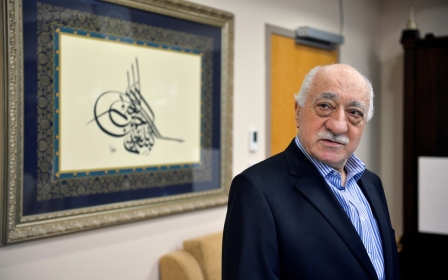Hey Trump: Daesh is beatable if you read the fine print

“We have a president who won’t even say the words ‘radical Islam',” thundered US presidential candidate Donald Trump in a speech that supposedly outlined his strategy to defeat terrorism. “And you can’t defeat an enemy if you can’t even identify who the enemy is.”
Donald, if you’re reading this - the enemy is Daesh, and as far as I can tell, it’s also the same enemy President Obama has dropped 15,000 bombs on over the course of the last 12 months – at a cost of $11m per day.
There are also nearly 4,000 US Special Forces deployed in Iraq, and if you include contractors and analysts, there are more than 6,000 Americans in the country to assist the Iraqi military defeat Daesh.
This force carries out everything from kill-or-capture missions to calling in air strikes, while also performing raids on high value targets.
Now, in case you’re still confused about who it is we are fighting, there is not a single state or non-state actor that goes by the moniker “radical Islam”.
But Trump isn’t wholly wrong when he identifies a radical ideology as the enemy. Long after Daesh is no longer capable of holding and controlling territory, the demented nihilist ideology of Daesh will last. Its propaganda will remain available online and shared among those who seek to attach a banner to their acts of wanton violence.
“In the Cold War, we had an ideological screening test. The time is long overdue to develop a new screening test for the threats we face today. I call it extreme vetting. I call it extreme, extreme vetting," Trump said on Monday.
Leaving aside the absurdity, questions of constitutionality and the sheer impossibility of vetting everyone entering the country, and ignoring Trump’s earlier proposal to ban all Muslims entering the US, it is actually quite feasible to identify those who are most at risk of sympathising with Daesh propaganda without casting a shadow over 1.6 billion Muslims.
This in no way suggests or even hints that profiling is a justified or even workable solution. The point here is that the Daesh ideology is beatable if we take a closer look at what we already know.
Local hotbeds
A new study has not only identified what it calls “Jihadist hotbeds,” but also examines how local issues perform the radicalisation process. In other words, there is a relationship between radicalisation and territory.
The report observes that while foreign fighters have travelled from all over to engage in fighting in Afghanistan, Iraq, and Syria – an overwhelming majority come from just a handful of states – namely Belgium, France, UK, Russia, Saudi Arabia, Tunisia, and Libya.
More significantly, those radicalised into the Daesh ideology are emerging from specific pieces of turf within each of these respective countries, and each “hotbed” has its own unique underlying socio-economic-political issues that produce their own primary drivers of radicalisation.
“As more detailed data has come to light concerning where the Islamic State’s foreign recruits come from, it has become increasingly clear that the flow of foreign fighters is not uniform across regions or countries,” observe the authors of the report.
“Within those countries that are the sources of the largest number of foreign fighters, specific cities, towns, and even neighbourhoods provide a disproportionate number of recruits as compared to other locations.”
For instance, the report identifies towns such as Pankisi Gorge in Georgia, Ben Guerdane in Tunisia, Derna and Sirte in Libya, the Molenbeek district in Brussels, and Minneapolis, among others.
Charismatic leaders
While the report acknowledges there are no generalizable predictors for radicalisation, it reveals how various trends can be observed, particularly how “local grievances and individual problems most often drive radicalisation and recruitment,” which also throws water on the thesis of internet-driven self-radicalisation.
“Another common trend amongst the disparate hotbeds of recruitment is the presence and influence of one or more charismatic figures already committed to the jihadist cause,” note the authors.
“There are numerous examples of outspoken and influential Islamic State recruiters, particularly in European recruitment hotbeds. These charismatic leaders tend to prey on vulnerable target populations in the town and neighbourhood they operate in, often targeting disillusioned youth and individuals with criminal records. Their presence and knowledge of the community and community issues, coupled with the peer-to-peer interaction coupled with the ubiquitous connectivity of social media creates the perfect storm for recruitment, with prospective recruits able to directly connect with recruiters or friends already in the so-called Caliphate, and therefore well-positioned to provide first-hand accounts of the Caliphate’s ostensible appeal.”
More than 7,000 Tunisians have travelled to Iraq and Syria to join Daesh, which represents an eye-popping 1 out of every 1,818 or so of the total population of Tunisia.
But despite such a large number, a majority come from just a few of the towns within the country: Ben Guerdane, Kasserine, and Bizerte. Moreover, the report notes that Kasserine also represented the origin of most Tunisians that travelled to Afghanistan to fight the Soviets in the 1980s.
These three Tunisian towns represent the poorest in the country, lack government infrastructure and funding, and are relatively isolated from hub centres of the country, and “with highly limited possibilities for legitimate opportunity”.
Here, “jihadist recruiters have capitalised on the vulnerabilities of a large and disillusioned youth population….The personal and direct nature of these interactions allows recruiters to infiltrate clusters of friends, neighbours, and family members, utilising existing social networks to spread the jihadist narrative,” according to report.
To illustrate further, more than 600 have travelled from Belgium to the self-proclaimed Islamic State – with 82 percent coming from municipalities with a per capita income below the national average, “while 35 percent lived in Belgium’s poorest towns” and 80 percent having Moroccan heritage.
In Belgium, when poverty, deprivation, identity crisis and alienation meet an active IS recruiter, the path to radicalisation becomes a little wider.
One imprisoned recruiter cited the “arrogance and deeply rooted Islamophobia of the Belgian state”.
“For more than 50 years now,” he wrote on a Facebook post, “Muslims are humiliated and forced to beg for simple rights, such as places to pray and locations for ritual slaughter. Any Belgium Muslim with foreign roots is still considered an asylum seeker by public opinion, and even when he speaks both official languages fluently, he constantly risks being treated like his grandfather back in the seventies.”
Minneapolis to Somalia
In the US, there are more than 3 million Muslims – with approximately 250 known cases of US citizens travelling to, or attempting to travel to Iraq and Syria. Significantly, more than a quarter has come from one city: Minneapolis.
With a large Somali population, Minneapolis has a history of Somali-Americans travelling to Somalia to join the al-Qaeda affiliate al-Shabaab – although a majority who joined cited a national responsibility to resist Ethiopian aggression.
“The rise of the Islamic State, however, has led to a shift in destination for many foreign fighter recruits from Minneapolis for whom Iraq and Syria have become more popular battlegrounds than Somalia,” note the authors, who also observed how effective one Daesh recruiter – Mohammed Abdullahli Hassan – has been in utilising Daesh propaganda among unemployed and disenfranchised Somali American youths.
In Libya’s “hotbeds,” a “traditional way of expressing discontent with the domestic situation” is cited as the primary driver of radicalisation in Derna, while in Sirte “exclusion from political participation favoured the installation of jihadist militias as a form of revenge against the new central authority”.
In Egypt, the Sinai region represents that country’s “hotbed” – with Daesh recruiters capitalising on anti-government and anti-Sisi sentiment among Bedouins on the peninsula.
All in all, the new study is both illuminating and depressing given it’s clear that Daesh recruiters, or any group that comes after it, will always find appeal while these respective local grievances of political, economic, social and personal grievances persist.
So when Trump says he has a military strategy to defeat Daesh or “radical Islam,” you can dismiss it as the simple-minded absurdity that it is. Defeating this ideology requires a near universal lift, a lift that is all but impossible without first defeating poverty, racism, and social-political-economic inequalities.
Oh, and if you think this has anything to do with Islam, recently leaked ISIS recruitment documents reveal 70 percent of recruits know almost nothing about the faith.
Good luck. We are going to need it.
- CJ Werleman is the author of Crucifying America (2013), God Hates You. Hate Him Back (2009), and Koran Curious (2011), and he is the host of Foreign Object. Follow him on twitter: @cjwerleman
The views expressed in this article belong to the author and do not necessarily reflect the editorial policy of Middle East Eye.
Photo: Republican presidential candidate Donald Trump speaks during a campaign event in Fairfield , Connecticut on 13 August 2016 (Reuters)
New MEE newsletter: Jerusalem Dispatch
Sign up to get the latest insights and analysis on Israel-Palestine, alongside Turkey Unpacked and other MEE newsletters
Middle East Eye delivers independent and unrivalled coverage and analysis of the Middle East, North Africa and beyond. To learn more about republishing this content and the associated fees, please fill out this form. More about MEE can be found here.





